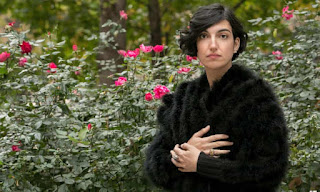Either / Or by Elif Batuman. '' Either / Or '' is basically a year in the life of an ambitious, bookish Harvard student circa 1996. We read what Selin reads - Pushkin, Babel, Freud, Chekhov and less happily for her, Martin Amiss - and watch her ruthlessly shake down her life, comparing it with the lives she encounters in fiction.
Elif Batuman's first two books, '' The Possessed '', a memoir and '' The Idiot, '' a novel, took their titles from Dostoevsky. The title of her second novel,'' Either / Or '' is on loan from Kierkgaard. Batuman has a gift for making the universe seem, somehow, like the benevolent and witty literary seminar you wish it were.
Kierkegaard's ''Either / Or'' published in 1843, is a book about how to live. It pits the aesthetic life, a life of books, art and sensual pleasure, against the ethical life, one of marriage and responsibility. What are the benefits and drawbacks of each? Are we screwed either way?
Batuman's narrator, Selin, is a sophomore at Harvard. She's caught between these poles of existence, and she's obsessed with Kierhegaard's book. She's consumed with books in general. She's sort of a person who will avoid a deed that seems anti-novelistic.
You might remember Selin. In ''The Idiot,'' she was a freshman. She fell for Ivan, whom a friend referred to as ''a seven-foot-tall Hungarian guy who stares at everyone like he is trying to see through their souls.'' Selin followed Ivan to Hungary. The experience was confusing.
I gave ''The Idiot'' a mixed review in The Times. I admired Batuman's intelligence - what a mass of sensibility she is - but felt the book seemed tentative, a peakless panorama.
''The Idiot'' has grown on me. Rereading big chunks of it recently, I felt more keenly Batuman's judgment, her attention, her discrimination, her understatement and irony.
There's a kind of dream in the way her thoughts coalesce and disband. ''Either/Or'' is an even better, more soulful novel. Selin is more confident and, more important, so is Batuman.
This novel wins you over in a million micro-observations. Departments at Harvard seem arbitrary to Selin, who wonders why there isn't a department of love. She writes : ''I wished there was a class where they could teach you how to calculate the right time to die.
The current arrangement - for everyone to sit there piously waiting for whenever their body happened to shut down - seemed so far from ideal.''
Selin, word-drunk, wonders why books of poems are so expensive when they have so few words.
She does occasionally climb out of own expensively educated head. At a Pilates class, the fights over mat placement are ''deeply stressful, in a way that made me feel like I understood the primal conflicts for land that formed the basis modern history.''
She wonders if this is what the Palestinians and Israelis feel like.
She attends a glittering, sadomasochaism-themed party for a literary magazine. What's revealed to her, in a typically canny observation, is '' the true face of all parties : how they were all, in one way or another, sadomasochism-themed.''
The brain isn't the only organ in this novel. One by one, Selin's friends and roommates are picked off, romantically and sexually, and she hates it. When people hook up, she thinks, it often means new and more tedious people are suddenly around.
Selin frequently refers to the diary she keeps. She's always juggling two books, one in which she reads and one in which she writes. Without them, she's like a Saturn without rings.
When you write as well as Batuman does, there are worse fates. But you wonder if the next two novels will count Selin's junior and senior years, in a Harvard quartet, and would happen if Batuman kicked away from shore.
The World Students Society thanks review author Dwight Garner.

.png)


0 comments:
Post a Comment
Grace A Comment!